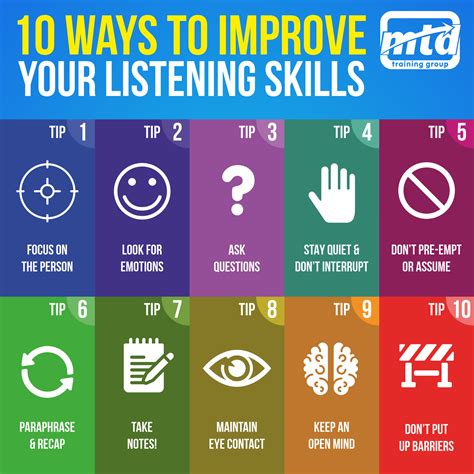What Are Listening Skills? Enhance Your Communication In English

Listening skills are the ability to actively hear and understand what others are saying. In today’s fast-paced world, communication is more important than ever before. The ability to listen actively and effectively is a crucial component of effective communication in English. It is a skill that can be learned and mastered with practice.
Why Are Listening Skills Important?
Listening skills are important because they enable you to understand others and to communicate effectively. They are essential in both personal and professional settings. Good listening skills help to establish trust and build relationships. They also help you to avoid misunderstandings and conflicts.
The Benefits of Good Listening Skills
- Improved communication
- Enhanced relationships
- Increased productivity
- Reduced misunderstandings
- Improved problem-solving skills
- Greater empathy and understanding
How to Improve Your Listening Skills
Improving your listening skills can be challenging, but it is possible with practice and dedication. Here are some tips to help you enhance your listening skills:
1. Focus on the Speaker
When someone is speaking to you, give them your full attention. Put aside any distractions and focus on the person speaking. Maintain eye contact and avoid interrupting them.
2. Avoid Jumping to Conclusions
It’s easy to jump to conclusions or make assumptions when someone is speaking. Avoid doing this, and instead, ask questions to clarify your understanding.
3. Practice Active Listening
Active listening involves paying close attention to what someone is saying and providing feedback. This feedback can be verbal or non-verbal, such as nodding your head in agreement or asking relevant questions.
4. Take Notes
If you’re in a situation where you need to remember information, take notes. This can help you stay focused and remember important details later on.
5. Repeat Key Points
When someone is speaking, repeat key points to ensure that you understand what they’re saying. This can also help you remember important details.
6. Be Patient
Listening can be challenging, especially if the speaker is discussing complex or emotional topics. Be patient and take your time to fully understand what the person is saying.
7. Practice Empathy
Empathy is the ability to understand and share the feelings of others. Practice empathy by putting yourself in the speaker’s shoes and trying to see things from their perspective.
The Do’s and Don’ts of Listening Skills
Do’s:
- Give the speaker your full attention
- Ask questions to clarify your understanding
- Provide feedback to the speaker
- Be patient and take your time
- Practice empathy
Don’ts:
- Interrupt the speaker
- Jump to conclusions or make assumptions
- Ignore the speaker or be distracted
- Be judgmental or critical
- Get defensive or argumentative
Conclusion
Listening skills are an essential part of effective communication in English. By following the tips outlined above, you can improve your listening skills and enhance your ability to understand and communicate effectively with others.
FAQs
1. What are the benefits of good listening skills?
Good listening skills have many benefits, including improved communication, enhanced relationships, increased productivity, reduced misunderstandings, improved problem-solving skills, and greater empathy and understanding.
2. How can I improve my listening skills?
You can improve your listening skills by focusing on the speaker, avoiding jumping to conclusions, practicing active listening, taking notes, repeating key points, being patient, and practicing empathy.
3. What are the do’s and don’ts of listening skills?
The do’s of listening skills include giving the speaker your full attention, asking questions to clarify your understanding, providing feedback to the speaker, being patient, and practicing empathy. The don’ts of listening skills include interrupting the speaker, jumping to conclusions or making assumptions, ignoring the speaker or being distracted, being judgmental or critical, and getting defensive or argumentative.
4. Why are listening skills important?
Listening skills are important because they enable you to understand others and to communicate effectively. They are essential in both personal and professional settings. Good listening skills help to establish trust and build relationships. They also help you to avoid misunderstandings and conflicts.
